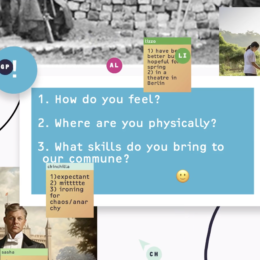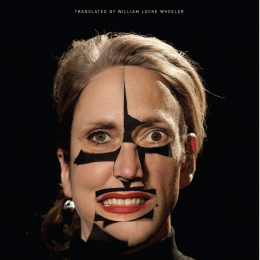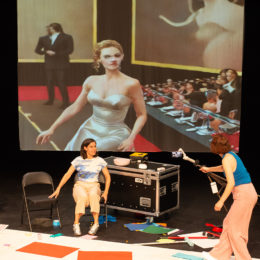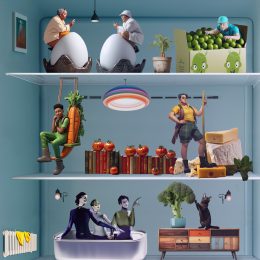NEWS
Next dates:
CHATBOT CHALLENGE
Chatbots are theatrical machines: they engage in lively dialogues, take on roles, and express and evoke emotions.
In CHATBOT CHALLENGE, two performers and a creative coder share the stage with chatbots and other AI systems. They explore the question: How much theater is in AI, and how much AI-theater have we already internalized? Starting from the core situation of theater – a live performance in front of an audience – the piece becomes an intimate encounter with global AI systems, their potential, and their strategies of deception. What happens when AI systems gain access to video, sound, stage, lighting, the bodies of the performers, and the reactions of the audience? Are chatbots the better performers? And how much work goes into their roles? CHATBOT CHALLENGE explores the big societal questions and challenges brought about by the current rise of AI.
moreCOMMUNE AI
HAU Hebbel am Ufer (HAU4), Berlin & ARGEkultur Salzburg & Kleintheater Luzern
Online-Premiere: 01. November at 8pm, on other days at 6pm and 9pm
01 - 05 November 2023
Errorrama Festival/ Kleintheater Luzern & HAU Hebbel am Ufer (HAU4), Berlin & Kana Theater Stettin
23 - 24 February 2024
ARGEkultur Salzburg & HAU Hebbel am Ufer (HAU4), Berlin
22 - 25 April 2024
At re:publica, Interrobang will present a new hybrid version of COMMUNE AI.
What is it like to live collectively with artificial intelligences? In COMMUNE AI, the audience establishes a commune in a digital space and inhabits a specially developed virtual platform. The human participants express political goals, desires, and expectations, while the AIs propose ways to implement them.
How do the AIs handle communal conflicts over money distribution, cleaning schedules, ownership, power dynamics, and jealousy? What new opportunities and risks arise from coexisting with AI systems? How can we reshape the profit-driven and often discriminatory structures of AI? And what contributions can AIs themselves make to these questions?
COMMUNE AI is a work in progress, with various versions of the performance now available—analog, online, and hybrid.
Trailer
morePremiere AI DEMOCRACY
Premiere: 16th of December 2025 at HAU Hebbel am Ufer, Berlin
In AI DEMOCRACY, the audience can actively shape the evening’s political agenda in an interactive exchange with performers and artificial intelligences. The performance explores and experiments with new forms of civic dialogue and political decision-making.
How can theater—as an art of gathering—critically reflect on and make democratic negotiation processes tangible, especially with the involvement of AI systems?
A co-production with HAU Hebbel am Ufer, Berlin. Funded by the Hauptstadtkulturfonds.
nd about “Commune AI”

Shared Living at a Non-Place – In the Online Performance “Commune AI”, the Interrobang Collective Explores Coexistence Between Humans and Technology
(…) With just a few keywords, the AI quickly crafts a “communal manifesto.” It includes the desire for community, wishes for individual space, and climate consciousness. [… ] Fortunately, the concept of a network that mutually supports each other sounds genuinely appealing. Later, participants will have to take a stance on the topic of ownership, and at that point, there will be an opportunity to remedy social inequalities in an almost absurdly simple way.
Berliner Zeitung about Interrobang and “The Philosophising Machine”:

“Interrobang develops a new form of interactive theatre “
Without doubt, the most important and difficult thing that Interrobang seeks is to offer as many different possibilities to the audience as possible to lure them out of their reserve and maybe even fear – certainly out of fixed patterns of behaviour and to expose them to new situations. For nearly ten years, the core group (…) have been experimenting with these very processes which they prefer to call ‘playing with the theatrical community’.
(…) Almost no other group carries out such intensive, self-critical research on this concrete theatrical awareness as Interrobang. (…) Interrobang’s participatory games are not simply inner journeys. You are lured into the cracks in the surface of reality you learn to see by playing the game.”
Performing Stories

Nina Tecklenburg’s book about new narrative practices in performing arts has now been published in an English translation edited by Richard Schechners „enactments“ at „Seagull books“: Performing Stories. Narrative as Performance.
Collecting things, reading traces, retelling performances, tailoring identities, gaming narration: this book offers a new perspective on narrative beyond written language and drama. A fundamental guide on storytelling in contemporary theatre.































